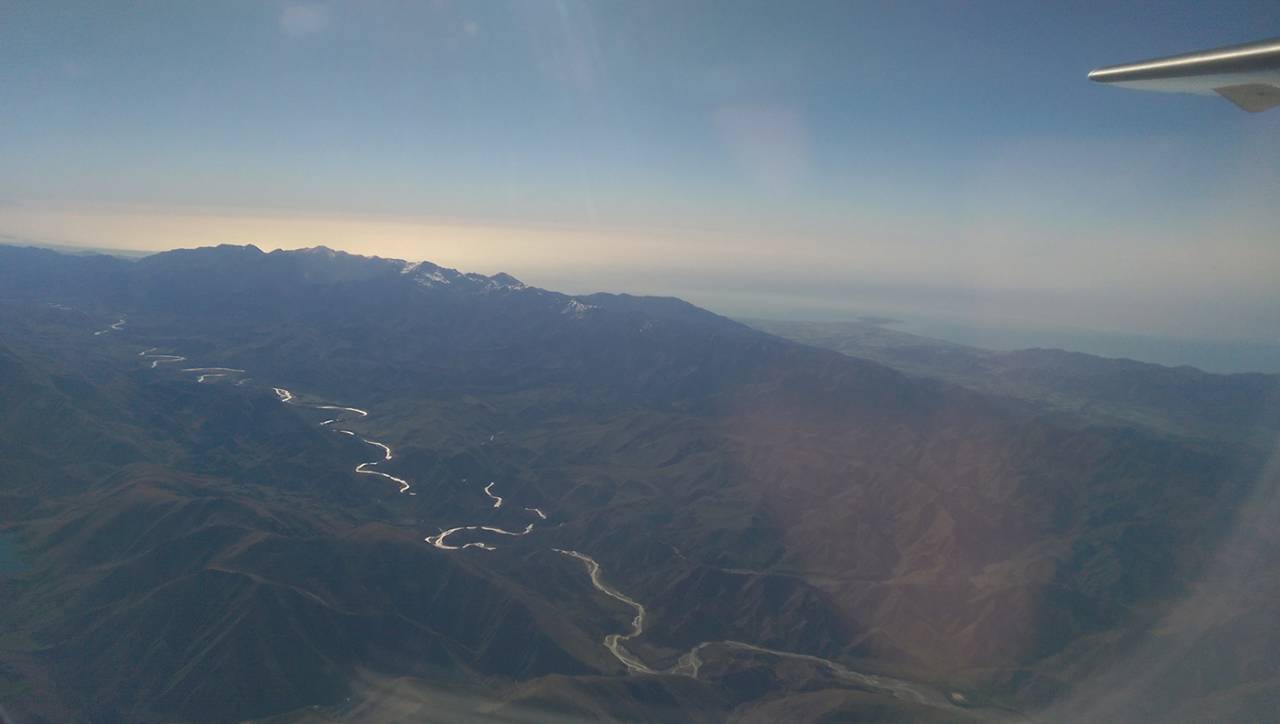The everlasting airport SIM-card machine blues
Our correspondent struggles with technology in New Zealand, then with the lack of it, and ponders the lax application of ecologically sound policies

Dang it, that's pretty: Canterbury from the plane window • Andrew Fernando/ESPNcricinfo Ltd
I arrive in Auckland in the afternoon and clear immigration and customs, but before I can set foot outside, I go through the now-standard procedure of being robbed at the airport. I blame mobile-phone companies.
Next morning, back at the airport, I am reminded of how charmingly intimate and considerate a country New Zealand is. As I await my flight to Christchurch, a Ms Schultz is summoned to her boarding gate no fewer than four times. The last of these announcements ends with: "…the other passengers have boarded and are waiting for you". You can almost imagine the whole plane staring expectantly at the door, then breaking out in huge cheers and high fives when she strides in triumphantly.
A violent earthquake hit North Canterbury in the days before I arrived. Although Christchurch has been spared this time, people in towns further north have been cut off by landslides, and damage to roads. On the radio, the presenter is sympathetically interviewing one of the victims, whose tiny town lies between two of the larger landslides. "Are your family okay?" she asks him. "How worried are you about aftershocks?" "Has there been damage to your house?" He gives five-word answers to each of these, but is more effusive when she asks how he is doing for supplies. "Aww, well, we haven't been able ta get to the shops since bloody Thursday, aye? We're runnin' outta beer and wine, so I'd say that's definitely a concern."
The Hagley Oval press area is not a box or room - it is a tent perched halfway up a grass bank. It's a wonderful place from which to cover a match when it's sunny, but a challenge when it's cold. On this rained-out first day of the series, an icy southerly rattles the metal framework and whips up the plastic sheets around us.

The hotel I am staying at has one of those signs encouraging patrons to reuse towels in order to reduce the hotel's impact on the environment. The idea that hotels care about the earth is, of course, complete crap - they merely want to cut down on bills. Many hotels would set fire to polar bear cubs if it turned them a profit. Still, I don't mind reusing towels, so I put mine back on the rack every day, only to find upon my return that that all towels have been replaced, in contravention of their own policy. Not only that, even the barely used shampoo bottles and soaps have been thrown out, and new ones put in their place. One morning I break open a tissue box and use just one sheet, then find a brand new box on the table when I return. I begin to wonder if I was actually sleeping in the same bed every day, or if these people were throwing it out daily and putting a brand-new one in its place.
Sri Lankan friends in Christchurch kindly have me over to dinner, and I feast enthusiastically on idi appa, pol sambol and a dark chicken curry. They are fairly recent immigrants to New Zealand and are still figuring out the lay of their new land.
New Zealand is almost too good to be a real country. It has its issues, of course, but there are no major ethnic tensions (not in comparison to most countries, at least) and no obvious signs of public unrest. It has a stable and trusted government (again, by global standards), and its national icon is a fittingly inoffensive animal. Sometimes it's so perfect, it's infuriating. This is my third trip around the country in as many years, and the breathtaking scenery keeps rolling by without relent. I am flying over north Canterbury - not an area especially reputed for its beauty - yet here lie these annoyingly gorgeous mountain ridges, all ruggedly serrated, while below, smug cords of captivating blue water wrap around the hills like ribbons on a present. The Pacific Ocean glints obnoxiously in the distance.
Over the past two decades it has become very cool to hate on Hamilton. Coffee-shop hipsters in Wellington will talk about how chlamydia is an airborne disease there, and how the Waikato river brings farming effluent through the middle of town (not true). Comedians will poke fun at Hamiltonians on TV, and Aucklanders heading south will say they take detours just to avoid going near the city.

Mohammad Amir comes to the post-play press conference - quite unexpectedly, as most journalists thought he was still off limits since his return from suspension. He understands our English but is more comfortable answering in Urdu, and he chuckles when asked about all the catches that have been dropped off his bowling.
The first Test I ever covered was in Hamilton, in 2009. I stayed too long in the press box one evening and managed to get myself locked in the stadium. I had to climb over a fence to get out, and in the process, dropped and damaged my laptop.
Andrew Fidel Fernando is ESPNcricinfo's Sri Lanka correspondent. @andrewffernando